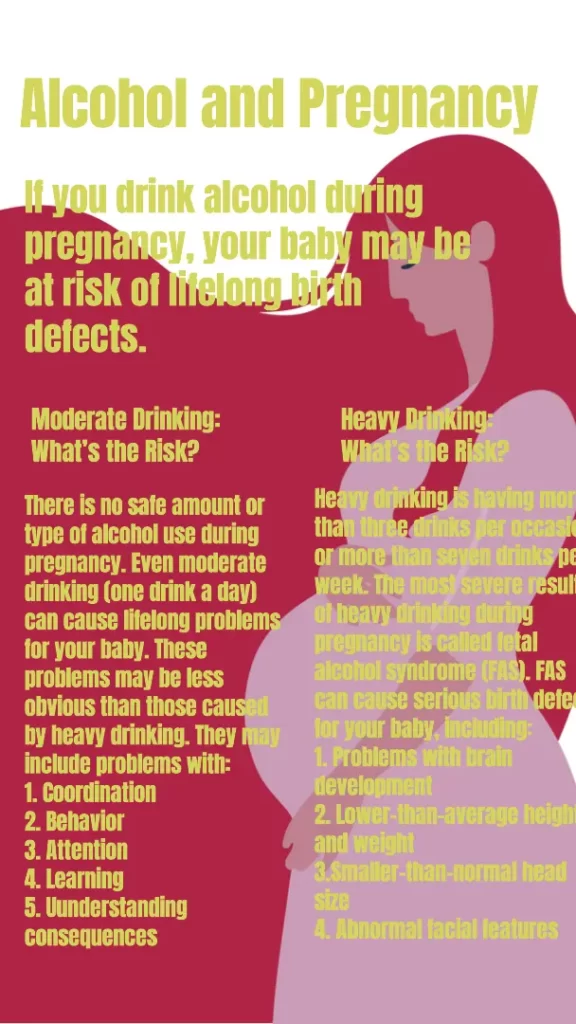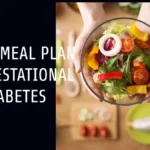
Pregnancy is a time of joy and excitement, but it can also be a time of worry and concern. One of the biggest concerns for pregnant women is the consumption of alcohol. Alcohol consumption during pregnancy can cause Fetal Alcohol Syndrome (FAS) in babies. FAS is a condition in which alcohol causes growth problems, brain damage, behavioral problems, and developmental issues in unborn babies. This condition occurs when a woman consumes an excessive amount of alcohol while she is pregnant.
But what happens if you accidentally consume alcohol while pregnant, such as eating a dessert with alcohol in it? In this blog post, we will explore this question and provide some answers based on the available information.
Related: The Benefits of Fennel Seeds During Pregnancy
Why Alcohol is Dangerous?
The consumption of alcohol by a mother can directly impact her baby through the umbilical cord. Engaging in alcohol use during pregnancy has the potential to lead to miscarriage, stillbirth, and a range of enduring physical, behavioral, and intellectual challenges collectively known as fetal alcohol spectrum disorders (FASDs).
what are the symptoms of drinking alcohol while pregnant?
Children affected by FASDs may exhibit the following traits and behaviors:
- Abnormal facial features, such as a smooth ridge between the nose and upper lip (philtrum)
- Small head size
- Shorter-than-average height
- Low body weight
- Poor coordination
- Hyperactive behavior
- Difficulty with attention
- Poor memory
- Difficulty in school, especially with math
- Learning disabilities
- Speech and language delays
- Intellectual disability or low IQ
- Poor reasoning and judgment skills
- Sleep and sucking problems as a baby
- Vision or hearing problems
- Problems with the heart, kidney, or bones
Related: Can You Eat Chicken Salad While Pregnant?
How Much Alcohol is Safe During Pregnancy?

The general consensus among health professionals is that no amount of alcohol is safe during pregnancy. The American College of Obstetricians and Gynecologists (ACOG) recommends that pregnant women should not drink any alcohol during pregnancy. The Centers for Disease Control and Prevention (CDC) also advises that pregnant women should not drink any alcohol at any time during pregnancy.
Related: Can You Safely Eat Takis While Pregnant?
Accidentally Consuming Alcohol While Pregnant
Accidentally consuming alcohol while pregnant can happen to anyone. It can be as simple as eating a dessert with alcohol in it, or drinking a non-alcoholic beverage that was mistakenly mixed with alcohol. The good news is that if you accidentally consume a small amount of alcohol, it is unlikely to harm your baby.
According to a post on the What to Expect forum, a woman who was 36 weeks pregnant ate a dessert with alcohol in it and was concerned about the potential harm to her baby. The responses from other forum members were reassuring, with many saying that a small amount of alcohol in food is unlikely to affect the baby.
Similarly, a post on the BabyCenter forum from a woman who accidentally ate a liquor-soaked dessert while pregnant received responses from other forum members saying that a small amount of alcohol is unlikely to harm the baby.
Related: Jalebi During Pregnancy? A Yummy Question!
What to Do if You Accidentally Consume Alcohol While Pregnant?
If you accidentally consume alcohol while pregnant, the first thing to do is not to panic. As mentioned earlier, a small amount of alcohol is unlikely to harm your baby. However, if you are concerned, you should speak to your healthcare provider.
According to a post on the Reddit forum, a woman who was 7 weeks pregnant accidentally ate ice cream with alcohol in it. She spoke to her healthcare provider, who reassured her that a small amount of alcohol is unlikely to harm the baby.
what is the Worst time to drink during pregnancy?
The first trimester of pregnancy (from six to 13 weeks) is considered the worst time to drink alcohol, as this is when most crucial development takes place, and damage during this period can lead to the most severe outcomes. The risk of fetal alcohol syndrome is also highest when pregnant women drink during the second half of the first trimester.
What are the some safe dessert options for pregnant women?
There are many safe dessert options for pregnant women. Here are some suggestions based on the search results:
- Fruit: A low-key dessert that can be the perfect sweet ending to dinner.
- Gelato: A creamy and delicious dessert that can be a great alternative to ice cream.
- Yogurt parfaits: A healthy and tasty dessert that can be made with yogurt, fruit, and granola.
- Wholemeal biscuits: A healthy and easy-to-make dessert that can be enjoyed with a cup of tea.
- Peanut butter: A nutritious and satisfying snack that can be enjoyed on its own or with fruit.
- Angel food cake: A light cake that is made with egg whites, flour, cream of tartar, and sugar. It can be topped with sliced fruit for a nutritious boost.
- Chocolate cake: A classic dessert that can be made with dark chocolate for added health benefits.
- Chocolate bananas: A sweet and healthy dessert that can be made by dipping bananas in melted dark chocolate.
- Dark chocolate: A healthy and indulgent treat that can be enjoyed in moderation.
what are some cultures that drink during pregnancy?
Some cultures have traditional practices that involve drinking alcohol during pregnancy. For example, in some regions, women may consume specific cultural beverages such as ‘changkey’, herbal brews, or ‘handia’ as part of traditional and customary events, worship, or social gatherings. These specific alcoholic beverages may have cultural and traditional significance and are often consumed as part of social fabric and lifestyle within these communities.
Additionally, in some countries, there are higher rates of alcohol consumption during pregnancy, with studies indicating that a significant proportion of women in countries such as Ireland, Belarus, and Denmark report drinking alcohol while pregnant. It’s important to note that despite cultural practices, medical guidelines universally recommend abstaining from alcohol during pregnancy due to the potential risks it poses to the developing fetus.
What are Some Tips for the Future?
Most women who inadvertently ingest a modest quantity of alcohol during pregnancy give birth to robust infants. It is the persistent exposure and substantial consumption that elicits the most apprehension. Yet, as a mother who has undergone this process five times, I would suggest utilizing this encounter as a subtle prompt to exercise greater vigilance regarding your dietary selections.
Guidelines:
- Scrutinize Labels: Many foods, especially desserts, may unexpectedly contain alcohol.
- Pose Inquiries: While dining out, confidently inquire about the ingredients of the dishes.
- Enlighten Acquaintances: Ensure those around you are informed of your alcohol avoidance.
- Explore Alcohol-free Alternatives: Numerous delightful options without alcohol await exploration. Dive in and uncover them!
What are some Additional Points to Ponder?
- Alcohol’s Impact on Pregnancy: Alcohol has the ability to traverse the placental barrier, posing a potential threat to the developing fetus.
- Fetal Alcohol Spectrum Disorders (FASDs): These disorders manifest in physical, behavioral, and learning challenges for a baby. Consistent alcohol consumption during pregnancy is a key contributor to the development of FASDs.
- Alcohol Presence in Foods: Certain foods, particularly specific desserts and dishes, may harbor alcohol. Vigilance is crucial; always scrutinize and verify the ingredients.
- Alcohol Evaporation in Culinary Processes: Not all alcohol dissipates during cooking. The residue can vary based on the cooking method and duration.
- Impact of Small Alcohol Quantities: Minor alcohol quantities, such as those present in certain desserts, are generally considered non-hazardous during pregnancy. However, exercising caution is paramount.
- Dehydration and Electrolyte Imbalance: Inadvertent alcohol consumption can result in these conditions, detrimental to both maternal health and the well-being of the baby.
- Dietary Caution During Pregnancy: Pregnancy necessitates heightened vigilance in dietary choices. Always inquire about the ingredients utilized in food preparation.
- Alcohol-free Substitutes: Numerous delightful alcohol-free alternatives for desserts and dishes traditionally incorporating alcohol are available. Exploring these options can safeguard against unintentional alcohol intake.
Conclusion
In conclusion, accidentally consuming alcohol while pregnant can happen to anyone. While it is best to avoid alcohol altogether during pregnancy, a small amount of alcohol in food is unlikely to harm your baby. If you accidentally consume alcohol while pregnant, the first thing to do is not to panic. Speak to your healthcare provider if you are concerned. Remember, the health and well-being of your baby is the most important thing, and taking care of yourself during pregnancy is essential for a healthy pregnancy and a healthy baby.
Frequently Asked Questions (FAQs)
How much alcohol is safe in pregnancy?
No amount of alcohol is considered safe during pregnancy.
When can alcohol affect pregnancy?
Alcohol can potentially harm the developing fetus at any stage of pregnancy.
What happens if you drink alcohol while pregnant?
Drinking alcohol during pregnancy may lead to birth defects, developmental issues, and fetal alcohol spectrum disorders.
Can I drink if my wife is pregnant?
It is advisable for both partners to avoid alcohol during pregnancy to support a healthy environment for the baby.












